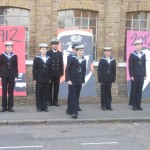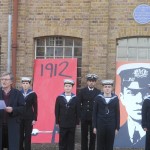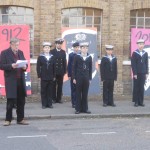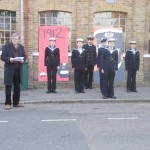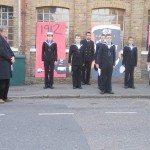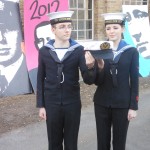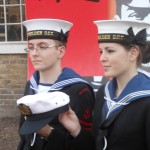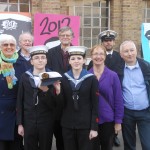As his guest at this year’s reunion our President Veteran Basil Francis had invited John Warwicker who had a career as a senior officer in the Police Force. Â He was introduced by and the toast proposed by Chairman Veteran Peter Turrall.
Peter Turrall
There’s one thing that this M/C does, he keeps me on my toes, anyway.
Mr President, fellow veterans. It gives me great pleasure to introduce to you this afternoon our honoured guest Mr John Warwicker, MBE. John was to accompanied here by Jilly Sullivan, his friend who looks or keeps an eye on him as John is severely sight disabled.
Now John has known Basil for many years and more recently attended a momentous birthday party for him. He has had a very illustrious career from being an officer in the Metropolitan Police, the CID, owning and sailing a yacht, obtaining a pilot’s licence, becoming a flying instructor and writing several books one of which entitled An Outsider Inside Number 10.  This has just been published and it is on this subject that John will give us a talk which he today has titled Yes Prime Minister.
Now, believe it or not, John now lives out in the Norfolk countryside but is a Chelmsford person having attended the local King Edward the Sixth grammar school. I’m sure we are in for a very interesting afternoon as John was the close protection officer for three Prime Ministers stretching over a large part of his career.
I therefore ask you fellow veterans, to be upstanding to welcome John Warwicker, our honoured guest and to drink his toast before he gives us some insight into his illustrious career following his close proximity to leading statesmen.
John Warwicker our honoured guest.
Now before I leave I have threatened John that if he goes beyond seven and a half minutes I shall kick him once, if he goes beyond ten minutes I shall kick him twice and if he goes beyond fifteen minutes, well, you can understand what happens. But I’ll see how we get on but I’m going to leave the floor entirely to John. Thank you.
John Warwicker
Let me take wine with somebody please. Ian (Francis) are you there? Can’t see that far but there you are – I’d like to take wine with you Ian for kindly transporting me here today in some considerable comfort, if I may say so and with a sure hand on the wheel and a mature approach to traffic congestion (laughter) and may I say your wagon is a good deal better than the Austin Ruby which I remember learning to drive in once upon a time.
Peter, thank you very much for that kind introduction, very kind, of course I can’t possibly comply can I? Totally impossible to comply with a lifetime or six years of life at Downing Street and a book at the end of it in the seven and a half minutes which he has allocated to me and I just thought Oh of course I was in the Royal Marines so I’ll follow the last order and that came from Peter, he gave me this notice: If any veteran present today endeavours to fall asleep in the next seven and a half to ten minutes he will be force marched to Tilbury landing stage and exported direct to Botany Bay. Now I expect/imagine there is a contingent force of bouncers standing by to comply but of course it all cuts into my time available and it’s important to say just why I was invited to come here today.
Yes, I was invited to come here today because I am a man of Chelmsford, yes, I was educated here my Father worked here and I remember only too well that Marconis was always a part of Chelmsford and Chelmsford would have been very little indeed without Marconis. I was also privileged, I think is probably the word, to be involve with Marconis perhaps through marriage, through Basil’s marriage to my cousin Eva, and to my own marriage to Elizabeth Penkman, whose Father worked for the Marine Division for his lifetime and her brother was Billy Penkman who, as I understand it, worked for the Radar Division. He may even be working for Marconis, in whatever guise they now are, for all I know, because I’ve lost touch with them.
But my credentials were quite good and I remember seeing Marconis turn out at the end of the working day in my early young days, which was a very long time ago, when they took over most of Chelmsford’s centre on bicycles. Nobody had a car in those days, almost nobody had a car in those days and New Street was flooded with an exodus of bicyclists from Marconi at knocking off time and at about the same time or just before or just after from Hoffman’s over the road.
I also remember, don’t I, that it part of a town in the War which was ably defended, uniquely defended almost by rocket ack-ack guns. Very unusual, they were all in the recreation ground and all around were barrage balloons and many of you here will remember the sight of those sturdy balloons flying about in bad weather, sometimes disappearing altogether in bad weather as the weak link in their wire gave way and they floated off to eternity. I also recall in one of the blitzes here and some of you will be there too that when we woke up in the morning the barrage balloons had all gone because the ack-ack guns had shot them down. This must have been a great help to the Germans who marked out the county town of Essex for further visits and, as some of you will recall, a very daring Luftwaffe pilot, was it in 1942 or 1943, in a yellow nosed Focke-Wulf darted out of low cloud soon after dawn and planted what I understand was a single bomb fairly and squarely on the New Street area of Hoffman’s creating a great deal of collateral damage to the front end of Marconis as well. Some of you will know more detail, I was just a schoolboy, I was an intruder, the area was cut off at the time and I had to use my local knowledge and my fast bicycle to get down there to see it at all., but this raid made a real mess of Hoffman’s and it must have inconvenienced many of you, perhaps, in Marconis at the same time.
All right. So I had better not go on about my credentials but I must just say briefly what happened to me after that because Peter has introduced the subject, and the subject was that I left Chelmsford after a while in Lloyds Bank, I went to the Metropolitan Police with more or less success, I was one of the few officers that I can remember who was neither corrupt, nor racist nor violent which now seems to be part and parcel of the way of life and in due course was fortunate enough to become a member of Special Branch at Scotland Yard. 1954 was when I joined Special Branch which was then mainly involved in anti cold-war activities as indeed were you on a different sphere locally here. Ours was counter espionage principally and the care and surveillance of known troublemakers and, of course, subversives.
We also had other interests in life and that was the protection of VIPs, certain VIPs, government VIPs, not the Royal Family but government VIPs. We had also the surveillance and protection of visiting dignitaries and as such I was privileged to be one of the team which cared for the late Shah of Persia when he was here and various presidents and so on and so forth.
Anyway, in due course having achieved what I thought was a very good foothold for promotion and an important place in life at Scotland Yard with the counter terrorism branch of Special Branch which specialised in those days in counter Irish extremist activities and which had two ways to go for any aspiring young officer, either up or out. And I was to my horror transferred to Downing Street to take over the lead role in the protection current Prime Minister who was then Harold Wilson. I thought I was in a bad time for it, that couldn’t have been more wrong. I didn’t want to be there it was a sort of pinstripe and hitherto people had stood around in pinstripe trousers a black jacket and a homburg hat and that, of course was on its way out because of the change of the world’s tempo in connection with the development of terrorism from Japan to Italy to Germany to Ireland and henceforth to the Middle East.
So our role as protection officers rapidly expanded in importance and authority. So I was fortunate enough to be there for two years with Harold Wilson which was one of the most entertaining times in my life and if you want to know the answer – no he was not sleeping with her at the time. (laughter) Please do read my book about it and you will find a pod of laughter.
Now, I then….., funny stories abound, may I tell, may I try to tell funny instance. I saw at the Commonwealth Prime Ministers Conference in Kingston, Jamaica in 1974 the British Government in secret action. The Commonwealth had 50 or more heads of state one morning they met in conference, Harold Wilson was the only…. only the heads of state were there no note takers no advisers, no press people, no nothing. Out pours Harold after three hours solid debate not always happy, he was looking unhappy, outside were waiting 12 of his advisers, that was civil service, that was diplomats, that was press officers, there were duty clerks, they all had a message for him, all wanted him to say yes or no like Father Missels at Moscow or don’t …. or support the pound because it’s about to collapse or don’t. They were quite big decisions and he had seconds to make up his mind about them and he was still then at the height of his powers and he was looking very concerned, then he started strolling up as he did… strolling up and down as he did when he was thinking in this totally sealed hotel, the Jamaica Pegasus. On the ground floor strode up and down purposefully, came to a dead end. The security doors, of course, were all locked for security purposes and if there was a fire we could all be incinerated in safety.
Then, he turned round and the doughnut round him moved with him, and they all moved back and they’d all got papers and papers under their arms and were holding papers and “Prime Minister could you tell me about this and Prime Minister are you going to have a press conference todayâ€. And so it went on and he was looking increasingly anxious and I was clearly the only one of his staff there who knew that he was looking exclusively for the gentleman’s’ toilet. Three hours in conference and he needed the gentleman’s toilet and he didn’t know where it was. But eventually he blundered into it. And they all blundered in with him, and I want you to picture the situation now if you will gentlemen – yes do. He immediately, ladies and gentlemen, he immediately presents himself at the urinal and what do you do if you are an adviser or a press officer or a diplomat. Do you stand around and watch your Prime Minister at the urinal or do you take part and all line up as well (laughter). And fortunately this was a large multi storey urinal and so they all pretended to take part and lined up in their own little white area. And it was chaotic they were still talking to him, still trying to get decisions that one senior civil servant had a whole bundle of official papers under his arm and he found that he had run out of strength and they gradually slipped out from under his arm into the flow (laughter) and only he was authorised to get them out (laughter) and then responsible for drying them and re-presenting them. In the meantime the Prime Minister having been first to the urinal was first to the wash basin where he took out all his teeth and started cleaning them – they’d been uncomfortable and one by one his advisers came out too – not all of them could join him in taking out their teeth, most of them were younger so they had to pretend to be interested and he completed his teeth and he made his decisions. I then had a responsibility to make sure that no enemies of the nation from the Commonwealth came into that particular toilet, I saw that all the stalls were empty and that secrets could be imparted and I thought this is a very funny way to run a country.
James Callaghan, couldn’t tell you anything funny about James. Didn’t have a sense of humour. In fact I think it sums up my three years with James Callagham very well when I say that he said to me one day “John, don’t make the mistake of thinking that just because I’m smiling I’m happyâ€. And that was the tone of the three years we spent there, really.
Now I just want to tell you a final story because Peter will get very naughty about it in a minute and start licking my legs or something like that – he’s got some sort of an arrangement down here, but, I might as well tell you just one anecdote about Margaret Thatcher. Everything changed with Margaret Thatcher, it was the end of the dandruff days for a start and instead of scruffy old aircraft and cars and untidiness we had some real distinction, love her or hate her she put the country on the map abroad certainly and later on you may say at home, or you may not.
Lusaka, and the Commonwealth Prime Ministers’ Conference of 1979 was one she’d inherited. Bear in mind she had no experience of senior ministership at all. Junior position as Education Minister once upon a time – she had no experience of what being Prime Minister was like sheer hell. She was immediately dragged away as soon as she got in Number 10 and briefed about nuclear weapons and her responsibility for pressing the button and annihilating all the people in Moscow and all those little decisions which the Prime Minister has to take on board, which almost nobody knows anything about. But she handled all this well. She handled a number of things extremely well. And where she didn’t know what was happening she was very wise in taking advice, and I greatly appreciated that, it made my job in protecting her with my team a great deal more efficient than it otherwise might have been. But she had to go to Lusaka for the Commonwealth Prime Ministers’ Conference and it was her first one. And there was the problem of Rhodesia.  Do you remember Rhodesia? It used to headline the news day after day, day after day, and it was nowhere near settled but everybody wanted a settlement except the Rhodesians. And so Lusaka was a front-line country adjacent to Rhodesia. It was extremely vulnerable because it was largely in the hands of freedom fighters armed with Kalashnikovs and no proper sense of discipline. And also it had been the subject of a raid by the famous Rhodesia’s Selous Scouts very recently in which they entered across the border, made their way to Lusaka, blew up the bungalow of the Matabele Joshua Nkomo and made away safely back to the birders of Rhodesia again without losing a soul. This meant that the country was extremely vulnerable and consequently we had a great team out there, 40 men in advance, including my chief inspector and we the main delegation went out on a DC10 and arrived at night and I got the call on my personal radio for my colleague only to say “It’s mayhem down here guvnor, it’s mayhemâ€. They’d taken – the press had taken over the whole of the apron which was supposed to be sacrosanct and available only to Customs and the aircraft and they’d taken it to a man. Everybody’s totally out of control and most coloured people, nearly all coloured people but the white journalists had infiltrated as well. Now this was communicated to Margaret Thatcher on the aircraft and she – I’d told her we’d got a big team here but she got the wind up and she started putting on dark glasses at night and when I reminded her it was night time she said “I’m afraid someone may throw acid in my faceâ€. Now this was the type of journey which she started at the Commonwealth Prime Ministers’ Conference. We got out, gradually made our way to safety, nothing terrible or dreadful happened. What we found out afterwards was that the front line states had contrived this situation to intimidate her because they wanted her to agree to a settlement to the Rhodesia problem and that was the democratic one man one vote settlement. The meeting went on for four days and on the fifth day, fifth night – it had been going on all day and an attempt to get a settlement about Rhodesia and to get a communiqué.  All these meetings demand a communiqué and it’s the biggest job to get a suitably worded communiqué so that everybody’s pleased about it. Well, the night drew on, the frogs started frogging and the crickets started cricketing, it was in the jungle almost this conference section, almost in the jungle and it was hot and it was humid and those of us who were not party to the heads of government discussions, there were aides waiting, the cars were lined up in various different echelons, 52 people or more and all of us waited around in more or less comfort and about 10 o’clock Dennis Thatcher turned up looking rosy and tanned and joined in and smoked a furtive cigarette and about half past eleven I think it was the time they came out, they all came out and she made her way disconsolately to the car. Now there was bad news for a start. The car was a Mercedes and you may be aware that although it is a refined car a Mercedes is not British, it is not British and she only really wanted a British car. So she was in a Mercedes. She came out, she was very quiet indeed, very downcast and it was apparent that she was about to give way and concede the loss of white minority rule in Rhodesia.
She got in the back, what would be the left hand side in the Mercedes and Dennis got in the centre and I got in the right hand side of the Mercedes, a coloured driver, a coloured ADC. Off we go and I notice she’s got a tear dripping down her cheek. She had had a very loyal concern about the white Rhodesians in particular because like so many of the other Commonwealth countries they had sacrificed so much during the war for the allied war effort. And she was about to let them down she felt. And so Dennis very sensibly kept quiet and then she looked up and she said to him “By the way Dennis, have you had a good day?â€Â Which I thought was pretty good of her, that was pretty good of her, she’d had a rotten day, a long rotten day, lost all the battles and “Dennis have you had a good day?â€Â “Yes my dear, yes, what a day†he said “What a wonderful day, got up leisurely what a breakfast, they did me a pudding this breakfast in the hotel, you know, and then of course there was all the cold meat and there was the salad and everything else there. So I had the most wonderful start to the day. Went upstairs, changed and the car was waiting for meâ€.
Now bear in mind that with all the spouses there they were all ladies except Dennis and they all go to hospitals and schools and they tap little babies on the head and things like that. Well, Dennis wasn’t part of that culture, indeed, and so his car took him off into the jungle and there he was given in what was apparently a national park a view of the wonderful animals that were there, a unique private view “Wonderful indeed, I had a most wonderful time and then lunch, lunch I was taken up on a mine and had a lunch. Oh God they sat us down, everyone treated us well, beautiful drinks, long drinks, kept us cool, everything was perfect. Went down a mine afterwards. Well copper mine I never realised it was so exciting, very exciting. Come up again, quick cup of tea and a couple of tinctures. Golf, and I had a wonderful round of golf which in this country you can hit the ball nearly four hundred yards because there is such a lack of dragâ€Â And he said “Had a wonderful roundâ€.
And then he suddenly realised, Dennis suddenly realised that this was going a bit far, she’d obviously not had a good day and he was going on about his good day and he said to her “The only thing I’m really sorry about is that I haven’t seen enough of you todayâ€. And she looked across at me and she said “I don’t know what you think Mr Warwicker but I really don’t think there will be time for any of that today, do you?†(laughter)
So don’t think that Margaret Thatcher had no sense of humour although I don’t think it was a great one.
Thank you very much ladies and gentlemen. Thank you very much Basil for arranging for me to be invited today. I’m very thankful to you and the committee, I’ve thoroughly enjoyed my lunch with you all, very impressed indeed, good to be back in Chelmsford and thank you very much for having me.



